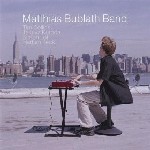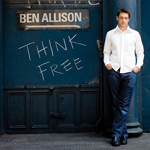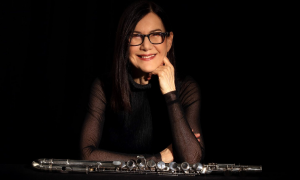Home » Jazz Articles » Interview » Matthias Bublath: Getting Organized
Matthias Bublath: Getting Organized
But in New York I was suddenly a nobody, and that's sometimes very healthy. The best musicians from everywhere come to New York, so there's a lot of competition, but there's also lots of opportunities to learn from your colleagues.

Although he's a thoroughly proficient player, the range and richness of his compositional prowess is especially striking. Starting in 2006 he has released a CD every year featuring his own material. His music is at times complex, but always melodic and greatly enhanced by his close collaborative relationship with

Tim Collins
vibraphoneb.1977
His debut, Matthias Bublath Band (Matthias Bublath, 2006), was split between his piano trio and his Hammond B3 band, while Second Angle (Matthias Bublath, 2008) was entirely devoted to the B3. Both received glowing and well-deserved reviews here at All About Jazz. In between, Latin Jazz (Matthias Bublath, 2007) was an excellent piano outing, featuring Latin and Afro/Cuban-inspired material. Voices (Downhill Music, 2009) is, perhaps, his best to date, enhanced by the veteran rhythm section of drummer Zach Danziger and bassist Tim Lefebvre, along with Ezra Brown's soulful sax.
AAJ: It's a bit unusual for come across someone who seems equally at home on a Hammond B3 or a piano. Lots of pianists also play Hammond, but few kick bass lines on the B3 pedals. You started playing organ and piano at age 8 and were more or less self taught, how in the world did you learn foot bass?
MB: Yeah I started on piano, playing boogie-woogie and a lot of blues stuff, you know, and playing left hand bass. But I really didn't start playing the organ until I moved to the States in 2000. I played organ in funk bands as a keyboard player, but the first time I actually played a Hammond organ was in the States because it isn't such a big tradition here in Europe and there aren't too many Hammond organs around.
AAJ: Back to the foot bass, if I'm listening correctly you are doing some foot bass lines, or are you mixing it with your left hand?
MB: Right, it's both, left hand and foot pedals, often doubled, with some changing around, it's my special technique, not only with the foot.
AAJ: A bit like

Jimmy Smith
organ, Hammond B31925 - 2005
MB: Yeah, but Jimmy Smith was mostly tapping with his left foot. In an ideal situation you would double everything you play to get a bigger sound, but sometimes you need to play chords with the left hand so it's just the foot. But if it gets really fast, for me it's better to do it with the left hand and just use the pedals to accentuate certain notes.
AAJ: You started so early, I wonder if you've noticed this. Like when learning a language, if you start before puberty it is all very natural and intuitive. I suspect that it's similar when learning a musical instrument. What do you think?
 MB: Yes, I think that is an advantage because you kind of grow up with it. I listened to so many blues records when I was very young and I tried to imitate them, so I sort of have that feeling in me. But yes, that's totally right, it's like a language.
MB: Yes, I think that is an advantage because you kind of grow up with it. I listened to so many blues records when I was very young and I tried to imitate them, so I sort of have that feeling in me. But yes, that's totally right, it's like a language. AAJ: Listening to your first three CDs it sometimes seemed to me like there were two very different musicians using the name Matthias Bublath. It's not just that the piano and organ have such different techniques and sounds, your musical personality, tastes, and approach also seems to change—on piano adjectives like complex and elegant come to mind. On organ, you seem funkier and much more about groove. Any truth to that?
MB: Yeah, I never thought about it like that because many people have told me that my organ playing is influenced by my piano playing. When somebody knows me as a pianist and then they hear me play organ, then they'll say, "So that's where you get that funky stuff from!" So I never thought the other way around, but I guess the funky thing is the nature of the organ. And in the last few years I guess I've explored my more lyrical side on piano. Perhaps because I've been working a lot more on classical music over the past few years and that's flowed into my piano playing.
AAJ: The music we hear as children seems to have an impact on the development of our musical tastes. What music was playing in your home during your childhood?
MB: My parents listen to Chopin a lot. I listened to it then, but didn't try to play it, so I don't know how much of an influence it was. But perhaps from just listening to it I absorbed something. And in Germany, of course, there's a lot of Mozart and Beethoven, so my parents are classical music fans. They weren't musicians, so they just listened for the joy of it.
AAJ: Any brothers or sisters who played a musical instrument?
MB: I have a sister who played a little flute, but she became a doctor so she had a very different direction.
AAJ: So how did it come to be that you had an instrument at home, did you ask for a piano?
MB: No, my father is a scientist and he was fascinated by the mechanics of a piano, so he bought an old piano, so that's why we had one at home. It was open and he liked pressing the keys and watching the hammers move and the whole mechanical aspect of it.
AAJ: With respect to the piano, who were some of your musical heroes and influences?
MB: Very early I would say

Jerry Lee Lewis
pianob.1935

Blind John Davis
piano1913 - 1985
AAJ: So you were into

Professor Longhair
piano1918 - 1980
MB: He wasn't too well known in Germany. I was very familiar with

Dr. John
piano1940 - 2019
Then, of course,

Oscar Peterson
piano1925 - 2007

Art Tatum
piano1909 - 1956

Chick Corea
piano1941 - 2021

Herbie Hancock
pianob.1940

Keith Jarrett
pianob.1945

Erroll Garner
piano1921 - 1977
AAJ: How about the Hammond?
 MB: Let me think, I knew a little bit about Jimmy Smith when I started, but not too much. But I always learned more by playing with people, so I wasn't too big on listening to records. I learned a lot by going to concerts. I started with the Hammond when I was at Berklee College in Boston, so I played sessions with all kinds of players when I was there. Later, I would say a big influence was Dr.
MB: Let me think, I knew a little bit about Jimmy Smith when I started, but not too much. But I always learned more by playing with people, so I wasn't too big on listening to records. I learned a lot by going to concerts. I started with the Hammond when I was at Berklee College in Boston, so I played sessions with all kinds of players when I was there. Later, I would say a big influence was Dr. 
Dr. Lonnie Smith
organ, Hammond B31942 - 2021

Larry Goldings
organ, Hammond B3b.1968

Sam Yahel
organ, Hammond B3AAJ: Hauling a B3 around to gigs is quite a chore, but a B3 and a piano — you don't really travel around with both do you?
MB: No, not really. You know, over here in Germany they usually rent an organ for me. In the States, there are lots of clubs that have organs. Like up in Harlem, they have that tradition so there are clubs that have a Hammond and it's great because you don't have to bring anything.
In Europe, they often have a great piano. And for emergencies I always have a Hammond type keyboard so I can have some security, just in case everything fails.
AAJ: You have real talent for composition, four CDs in four years, with about 40 compositions—very strong material. Your music is often complex, but always very melodic. One of the rare compositions from someone else was

Antonio Carlos Jobim
piano1927 - 1994
MB: Oh yes, I'm a big fan of Brazilian music and I've played with a lot of Brazilian bands. Actually, I lived with Brazilians when I was studying in Boston. So my Brazilian roommates were a big influence on me, and, yes, especially Jobim. I like a lot of his tunes and I learned a lot of his songs.
AAJ: How about Djavan?
MB: Yeah, big time—and

Elis Regina
vocalsb.1945

Joao Bosco
guitarb.1946
AAJ: Did you ever listen to that record with

Toots Thielemans
harmonica1922 - 2016
MB: Yeah, that's great. And maybe my favorite record is that one with Elis and "Tom" Jobim [Elis & Tom (Polygram, 1974)] that's kind of like my Bible.
AAJ: The one with the "Waters of March"? Oh yeah, that's just fantastic.
MB: That's a great record, one of my all time favorites, but it's not too usual to play Brazilian music with organ.
AAJ: I remember way back there was a great album with

Astrud Gilberto
vocals1940 - 2023

Walter Wanderley
organ, Hammond B31932 - 1986
MB: Oh that's right, I do think I remember hearing that.
AAJ: In terms of composers, who were some of your other influences?

MB: Now I'm checking out a lot of classical stuff, so again I would think of Chopin and Beethoven. Not so much for my music, but kind of from the point of logical development and ideas. Also Franz Schubert, I've been playing his works a lot lately.
AAJ: Could you talk a bit about your approach to composing?
MB: In New York I forced myself to write a lot. I try to write a song every day. And then I try it on my friends when we do a session and I get input from everybody. That's my approach, just doing it, then playing it live, and then the compositions grow.
AAJ: I noticed you guys go into the studio and knock out 10 cuts in a day.
MB: Yes, we're pretty fast and I have a lot more tunes. I bind my music into books and I think I have five of them now. So my friends kid me about the "Matthias books." I've got a lot of material left so I can be pretty selective in what I record.
AAJ: I understand you didn't learn to read music until you were about 20. Are you a good sight reader now?
MB: Now, I think I'm OK. Initially, I was self taught, so I didn't need to read. I'm kind of doing it backwards: you know, guitarists usually start playing rock and roll music, and then they go into jazz. Pianists usually start with classical and then they go into jazz. So, I'm more like a guitarist on piano.
Now I'm doing the classical stuff that most people do when they are young.
AAJ: When you compose, do you find it useful to use software or MIDI technology to generate sheet music?
MB: I do use it to make charts for other musicians, but to compose I prefer the old way, using pencil and paper. I think if you compose on the computer it forces you into a certain direction. If you record something, and then you feel like you have to copy and paste something, to me it feels like music out of a box. Using a pencil with an eraser makes me feel more flexible. If it's in the computer it looks so good you don't want to erase it (laughs.)
AAJ: You studied in Linz, Austria and in Boston. Could you compare and contrast the differences in your musical education in Austria and America?

MB: I also studied in New York at the Manhattan School of Music, so I had six years of study.
In Linz, it was very loose. It was just a bunch of jazz musicians, it was really like hanging out and playing a lot. Because at the time they didn't really have a director for the jazz program, so things were very loose. For me, it was great because it was a creative environment. We tried out lots of things and many of my fellow students are successful in Germany right now, even though we didn't have very strong leadership in the program at the time.
When I came to Berklee everything was very organized. You had your lessons once a week, you had homework, and it was good because I developed my skills like arranging and harmony. You learned concrete skills, so I would say it was more effective. In Austria, it was also a free jazz scene, very different from Berklee.
AAJ: How important to your musical career was your decision to live in New York?
MB: I think it was very important because if I had stayed in Europe I wouldn't have met so many great musicians like you do in New York. Plus, you don't play as much and you don't gain as much experience. You know, by the time I was finishing up in Austria I was already one of the top players in Southern Germany. But in New York I was suddenly a nobody, and that's sometimes very healthy. The best musicians from everywhere come to New York, so there's a lot of competition, but there's also lots of opportunities to learn from your colleagues.
AAJ:

Tim Collins
vibraphoneb.1977
MB: I met him in New York through the Manhattan School, he's a little older than I am, so we didn't meet studying. It was somehow through the Manhattan School network. We were also neighbors in Astoria Queens, so we hung out and played a lot together in various bands. He's of course a great friend, too.
AAJ: Takuya Kuroda (trumpet) is another gifted musician who has played on most of your CDs. How long have you known each other?
MB: Yeah I played with him on my very first gig in New York, and he brought me to Japan twice, and I've brought him to Germany three times now. It's great to have people like this who know all your tunes. These two guys already know most of my tunes by heart. And we have very stable units, you know with the three of us, and we can add different rhythm sections to it and try different flavors.
AAJ: The two of them give you a very identifiable sound with trumpet and vibes. I'm guessing when you compose you are often thinking of Tim and Takuya.
MB: That's true because with them I often try my tunes out. So, for me they are part of the process of composing songs.
AAJ: On your new CD Voices, you have quite a mix of styles with you on piano, Rhodes, and Hammond B3, this time with Ezra Brown (t.s.), Zach Danziger (dr), Tim Lefebvre (bass), Anne Drummondi (flute), along with Tim and Takuya. This was quite a group, that's got to be a real kick for you to have players like this interpreting your music?
MB: It is, for me it's a dream come true, especially playing with Zach and Tim, because I grew up listening to their recordings. I finally met them in New York and we played a few gigs, so I asked them to be on my CD.
AAJ: Ezra Brown was also a great addition to your last CD.
 MB: Yes, he's just incredible. He's from Mississippi and he's got that R&B feel and a lot of soul in his playing. And he's got a great ear for music, he hears everything.
MB: Yes, he's just incredible. He's from Mississippi and he's got that R&B feel and a lot of soul in his playing. And he's got a great ear for music, he hears everything. AAJ: It's interesting, you came from a blues background, but you haven't had a guitarist on any of your CDs. Was that a conscious decision?
MB: Yeah, you know there are so many organ trios with guitar, so especially for my organ CD Second Angle, I didn't want to have a guitar because I wanted to try a new instrumentation. So I choose to use the vibes as a chordal instrument. And just being a pianist, you play lots of chords, so I wanted to do the chordal stuff on my records.
But I do play with guitarists, and maybe in the future, but with the music I've recorded so far I just didn't hear a guitar in my mind.
AAJ: I noticed you guested on a recording with the young Bavarian pop phenomenon Claudia Koreck. How did that come about?
MB: I still know a lot of people in Munich, so sometimes I get calls for stuff. That's actually why I'm in Germany right now because we just did a CD release at the Zircus Krone in Munich last Friday.
 AAJ: You did a project with your father here in Germany entitled "Science meets jazz." In America, the name Bublath doesn't ring a bell with most people, but in Germany your father is a prominent television personality with a scientific background. How did the project go?
AAJ: You did a project with your father here in Germany entitled "Science meets jazz." In America, the name Bublath doesn't ring a bell with most people, but in Germany your father is a prominent television personality with a scientific background. How did the project go? MB: I think he always wanted to do something like that—give people some education but entertain them at the same time. So, last January we did four shows and it worked very well, and we're going to do another one on Oct. 30th at BMW in Munich.
There is a bit of narration and a giant video projection screen with visuals of the universe, and we play behind those movies. For us it's a full concert, and towards the end we can really express ourselves.
AAJ: Seems like a "Cosmic Suite" is just waiting to be composed, with movements like "The Big Bang," "Singularity," "String Theory," "Dark Matter," "Black Hole" ...
MB: It's true, there are many possibilities. And you know with a project like this we reach a much larger audience than is normally the case with jazz.
Selected discography
Matthias Bublath, Voices (Downhill Music, 2009)
Claudia Koreck, Barfuss um die Welt (Ariola Germany, 2008)
Matthias Bublath, Second Angle (Matthias Bublath, 2008)
Matthias Bublath, Latin Jazz (Matthias Bublath, 2007)
Chicken Gravy (Takuya Kuroda), It's better with Chicken Gravy (Chicken Gravy, 2007)
Matthias Bublath, Mathias Bublath Band(Matthias Bublath, 2007)
Giana Viscardi, Tinge (Megaphon, 2002)
Photo Credit
All Photos Courtesy of Matthias Bublath
Tags
Matthias Bublath
Interview
Alan Bryson
United States
Tim Collins
Jimmy Smith
Jerry Lee Lewis
Blind John Davis
Professor Longhair
Dr. John
oscar peterson
Art Tatum
Chick Corea
Herbie Hancock
Keith Jarrett
Errol Garner
Lonnie Smith
Larry Goldings
Sam Yahel
Antonio Carlos Jobim
Elis Regina
Joao Bosco
Toots Thielemans
Astrud Gilberto
Walter Wanderley
Comments
About Matthias Bublath
Instrument: Organ, Hammond B3
PREVIOUS / NEXT
Support All About Jazz
 All About Jazz has been a pillar of jazz since 1995, championing it as an art form and, more importantly, supporting the musicians who make it. Our enduring commitment has made "AAJ" one of the most culturally important websites of its kind, read by hundreds of thousands of fans, musicians and industry figures every month.
All About Jazz has been a pillar of jazz since 1995, championing it as an art form and, more importantly, supporting the musicians who make it. Our enduring commitment has made "AAJ" one of the most culturally important websites of its kind, read by hundreds of thousands of fans, musicians and industry figures every month.





 Buy Now
Buy Now























